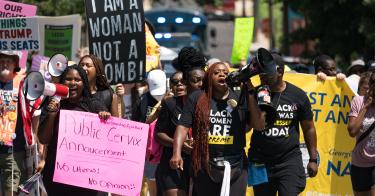The general has sounded the retreat. Will the soldiers follow?
That is the question raised by Dobbs v. Jackson Women’s Health Organization, where the Supreme Court declared that the federal courts should retreat from their invasion of the democratic provinces of legislatures on the issue of abortion. But will the lower courts obey?
One appellate court has obeyed the call and has resolved to make right the errors it committed when it first rallied behind the Supreme Court’s abortion misadventure of Roe v. Wade nearly 50 years ago.
The case is SisterSong v. Governor of Georgia. In it, the 11th U.S. Circuit Court of Appeals just last week upheld a state law that limited abortions, and it shows how Dobbs will push the federal courts out of the abortion issue and leave it to the states.
At issue in SisterSong was a Georgia law called the Living Infants Fairness and Equality Act. The act includes unborn children in the definition of “natural person” wherever that phrase appears in the Georgia Code and prohibits abortions after a heartbeat is detected (excluding ectopic pregnancies and miscarriages).
In 2019, a group of abortion-rights advocacy groups and abortionists sued to stop enforcement of this act on two grounds: (1) that it was an unconstitutional violation of women’s 14th Amendment substantive due process right to abortion as recognized in Roe v. Wade and Planned Parenthood v. Casey, and (2) that the definition of “natural person” was unconstitutionally vague on its face.
The abortionists won at the trial court on both counts. The judge there ruled that Roe and Casey prevent states from banning abortion before viability—considered to be around 22 to 24 weeks of pregnancy—something Georgia’s law would do. The judge also ruled that the definition of “natural person” was unconstitutionally vague because it forced the abortionists “to hypothesize about ways in which their conduct might violates statutes amended by the [act].”
The abortionists were granted a preliminary injunction that prevented state officials from enforcing any provision of the law. The Georgia state officials appealed.
While the case was pending before the 11th Circuit, the Supreme Court took up Dobbs, so the 11th Circuit waited to issue its ruling in the case until Dobbs was decided. In Dobbs, the Supreme Court overruled Roe and Casey, holding that “it is time to heed the Constitution and return the issue of abortion to the people’s elected representatives.”
That changed everything for the SisterSong appeal. The 11th Circuit noted that “Dobbs abrogates many previous decisions of this Court,” and that an “intervening decision of the Supreme Court overrules our precedents whenever the decision is clearly on point.”
It’s hard to see how much more “on point” a case could be than Dobbs.
Based on that, the abortionists’ first claim—that Georgia’s law violates women’s substantive due process right to abortion—failed. The Supreme Court held in Dobbs that there is no such right and that Roe was “egregiously wrong” to invent it.
That means that any state abortion restriction will pass muster if “there is a rational basis on which the legislature could have thought that it would serve legitimate state interests.” One of those interests, the court explained, is “respect for and preservation of” unborn life “at all stages of development.”
Based on this, the 11th Circuit held that Georgia’s heartbeat law was rational.
That left the question of whether a definition of “natural person” that includes unborn children is unconstitutionally vague. As a general rule, statutes are unconstitutionally vague when, to quote the Supreme Court in Beckles v. United States, they “leave[] judges and jurors free to decide, without any legally fixed standards, what is prohibited and what is not.”
The 11th Circuit explained that to succeed on a void-for-vagueness challenge, “the challenger must establish that no set of circumstances exists under which the Act would be valid.”
Here, the abortionists responded by arguing that the definition burdened their chosen profession and interfered with the “right to procreate.”
If that seems nonresponsive to the legal standard, that’s because it is. And the 11th Circuit noted it.
In truth, that sort of response probably would have worked before Dobbs. As the Supreme Court noted in the Dobbs case, previous abortion litigation “distort[ed] … many important but unrelated legal doctrines.” In short, pro-abortion litigants were treated differently—better—than litigants in other cases. But that ended with Dobbs.
The 11th Circuit reversed its old march toward abortion’s continued expansion, saying, “We must treat parties in cases concerning abortion the same as parties in any other context,” and, “We decline to engage in abortion exceptionalism.”
The court focused on the text of Georgia’s law in the same way it would focus on the text of any other law and held that “it is hard to see any vagueness” in the law. It explained that “a person of reasonable intelligence” can understand that the “core meaning” of the provision is to expand the definition of person to unborn children.
The abortionists’ challenge to Georgia’s anti-abortion law failed and dropped out of the federal courts.
What happens next is up to the people and, possibly, the judges, of the state of Georgia. There may be more lawsuits in state court if abortionists can argue that some provision of the state constitution protects abortion. And there will undoubtedly be fights in the elected branches as the people and their representatives try to win the abortion fight in the court of public opinion.
But the federal courts should no longer claim to be super legislatures on the abortion issue. No longer should acts of “raw judicial power” override the democratic process. And no longer should judges’ and justices’ desire to protect abortion distort legal doctrines to give abortion activists special privileges.
One circuit court has chosen to follow the Supreme Court as it gives up its wrongly claimed power over abortion. Will the others?
This piece originally appeared in The Daily Signal



